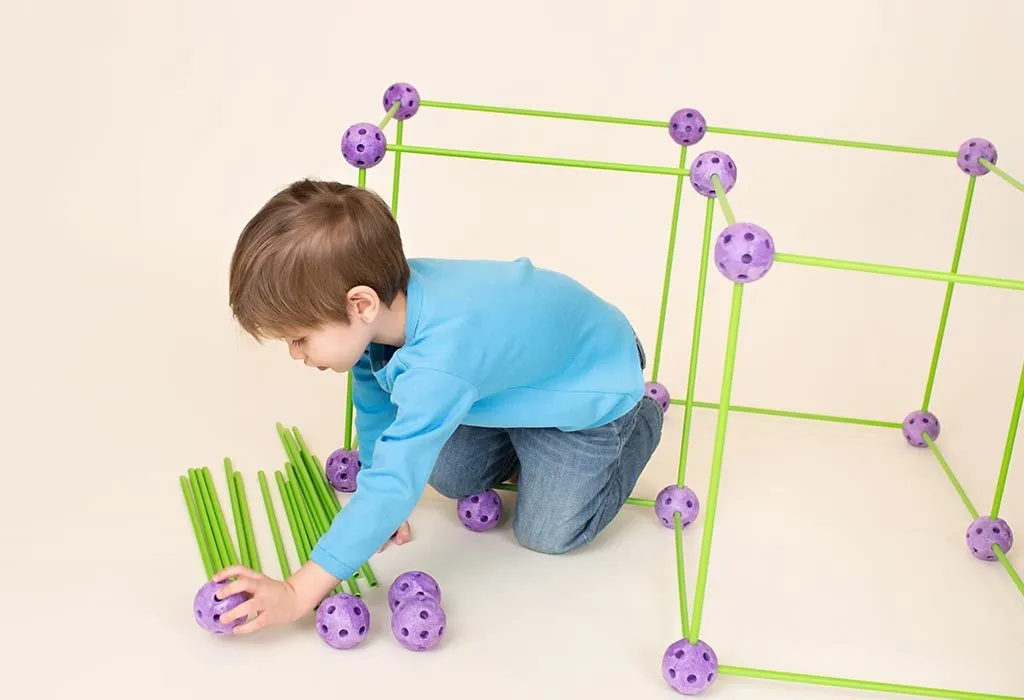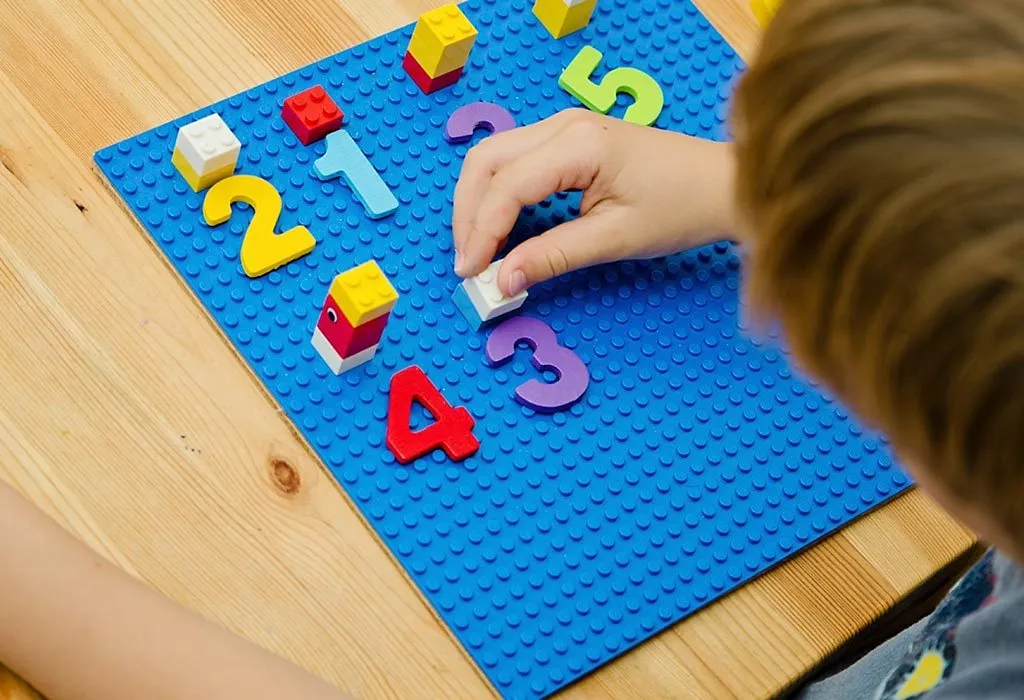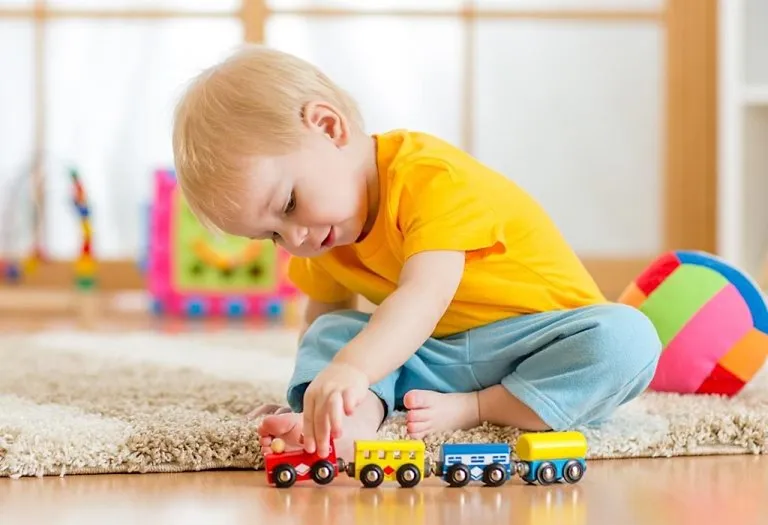Solitary (Independent) Play – Benefits and Why It Is Good for Kids
- What Is Independent Play?
- Some Examples of Solitary Play
- Independent Play Age in Children
- What Are the Different Types of Solitary Play?
- Benefits of Solitary Play for Children
- Solitary Play Activities for Kids
- How to Encourage Independent Play in Children
- FAQs
Adults put in a lot of hard work to earn a living, often juggling various responsibilities to provide for their families. But a kid’s life is quite different—they simply need toys, a bit of imagination, and, ideally, a playmate to keep them company. However, the company isn’t always available, especially when parents are busy striving to secure a bright future for their children. This is why encouraging solitary play in early childhood is essential. When your little one learns to enjoy their own company, they begin developing resilience, independence, and problem-solving skills, preparing them to face life’s challenges confidently and independently later on.
What Is Independent Play?
Solitary play’s definition implies playing on your own. As a matter of fact, babies can start playing as soon as they start focusing on objects with their eyesight. When a baby is given an object that amazes him, he usually spends a lot of time contemplating and wondering what it is.
Solitary play is the beginning of one’s independent living and a step towards developing social interactions. When a baby learns to enjoy his own company, he does not need to depend on anyone, and he will also learn creativity by doing his own thing. However, to be able to leave your kid alone, a lot of patience and tricks should be kept in mind.
Some Examples of Solitary Play
Solitary play is a valuable part of early childhood development, helping children learn independence, creativity, and self-sufficiency. Here are some engaging examples of activities that encourage solitary play for young kids:
- Holding and examining a toy
- Shaking a rattle to create sounds
- Flipping through a book’s pages as though reading
- Stacking blocks or cups
- Playing with a train set
- Working on a puzzle
- Playing with playdough
- Setting up a kitchen and engaging in various activities
- Conducting a tea party with dolls
- Making a drum by tapping on utensils
- Colouring or drawing
Independent Play Age in Children
Solitary play age in children starts as soon as they begin to see things clearly. But some experts have a different say. They believe that a baby can be indulged into solitary playing once he reaches the 6-8 months mark. This is because, by this time, a baby can hold objects while sitting on his own.
What Are the Different Types of Solitary Play?
There are different ways to encourage in your little one. Though the noteworthy ones include:
1. Open-Ended Toys
Kids love to explore things. Owing to their naïve nature, kids want to explore everything that gets into their hands. And, if you are choosing an open-ended toy, the kid would indulge with it for a longer duration without distraction. If there were an option of playing with the same object in different ways, kids would love it.

2. Set Up a Stage of Things
When you combine different toys together in a fun way, a kid would instantly get involved. It is similar to making a story setting with different objects decorated to make things interesting and fun.
3. Imaginative Play
Prefer indulging the kids in playing games where they have to activate their brain cells to work out things. Something like building blocks or putting a key to the toy so that it dances would be an interesting task.
Benefits of Solitary Play for Children
The ubiquitous benefits of encouraging independent play in toddlers include:
1. Having Fun on their Own
When you let your kids play by themselves with no support at all, you give them a chance to have fun in their own imaginative ways. This, in turn, helps them later in life by not depending on anyone for their fun and happiness.
2. Emerges the Imagination In them
You will not realize how imaginative your baby is until you leave them alone. Eventually, you’ll be surprised to know how they interpret things and play with them uninterruptedly.
3. Makes Them Socially Independent
Life is all about being your own hero. And the sooner your kid realizes it, the better. Independent play for infants aids in teaching your little ones how to enjoy their own company. In turn, they will not depend on anyone for anything, no matter what the situation.
4. Prepares Them for School
When you leave your kid to play on their own, you indirectly prepare them for school. You can’t be always by your kid’s side, and this is a fact. Children usually cry and can’t let go of you when they start going to school. And, when you teach them how to be happy in their own company, they’ll happily step into the new learning phase without you holding onto them.
5. Makes Them a Problem Solver
Kids rely on us for everything. In their mind, they know the fact that you are there for them always. Leaving your kids alone to play by themselves would teach them the importance of staying alone and loving their own company. Moreover, they’ll become problem solvers and will find their way out of any situation in the later stages of life.
6. You Get the Much Needed Break
Everyone is aware that handling kids is a challenging task. From changing diapers to helping them take their first step, parents do everything that is needed. By encouraging toddler independent play ideas, you help yourself too. You can enjoy some time for yourself while your little one is busy playing.
7. Boosts Self-Confidence
When children engage in solitary play, they learn to trust their abilities and make choices independently. This boosts their self-confidence as they realise they can manage on their own and solve problems without assistance.
8. Enhances Focus and Concentration
Playing alone allows children to focus on a single activity for an extended period, strengthening their attention span and concentration skills. This focus can benefit them in school and other activities that require sustained mental engagement.
9. Fosters Emotional Resilience
Through solitary play, children learn to manage small frustrations and develop patience. This builds emotional resilience, helping them handle challenges and setbacks calmly as they grow.
10. Improves Decision-Making Skills
Solitary play gives children the freedom to make their own choices without guidance. This helps them develop strong decision-making skills, as they learn to weigh options and outcomes on their own.
Solitary Play Activities for Kids
Solitary play activities are a wonderful way for children to develop independence, creativity, and focus. Here are some engaging solitary play activities that can keep kids entertained and learning:
- Giving your child sensory toys like socks filled with rice or playdough
- Putting on their favourite music for them to enjoy
- Asking them to match images from a book with real-life objects
- Providing age-appropriate toys that they can stack, build, or gather, such as LEGO blocks, Magna tiles, wooden blocks, kitchen sets, or train sets
- Building them a tent filled with their favourite toys
- Giving them child-safe magnets to explore
- Offering sidewalk chalk for drawing
How to Encourage Independent Play in Children
There are numerous ways that you can follow to encourage solitary play in children. What are those ways? Have a look for yourself.
1. Provide them with the Right Toys
Kids love anything that is unique and amazes them. Give them innovative toys like building blocks or clay they could experiment with. You could also buy your kids Cubelets with Lego pieces or puzzles that they could solve.

2. Give Your Kids Space
Giving your kid his own space to analyse and do things would be beneficial. A kid should be given his space to and the freedom to make his own choices. The moment you force anything on them, they tend to become more dependent.
3. Understand Your Child’s Needs
Some children may instantly find their comfort in playing alone while some may take their own sweet time in finding their happiness alone. You need to understand your child’s psychology and his individual needs rather than pushing them into something they don’t like.
4. Give Them an Open Play Space
Giving your kids the right space to play would be the right thing to do. Giving them an ample and safe space. You could even refer to play space designs for the same.
5. Do Not Interfere
Letting your kids play without interrupting them would be encouraging to a great extent. Even an appreciation or a suggestion should not be encouraged as this could break their flow and interest at the same time.
6. Let It All Go Natural
Do not force your kids into self-playing. Whether he is 6 months or 3 years old, indulging in independent play and letting it come about naturally would be the best option. Consider not telling them what to do and what not to do. Use easygoing words that sound kind and encouraging. By simply giving them control over their playtime, you would be doing the needful.
FAQs
1. Does encouraging solitary play help children with special needs or sensory sensitivities?
Yes, solitary play can be especially beneficial for children with special needs or sensory sensitivities. It provides them with the space to engage in activities at their own pace without feeling overstimulated or pressured by social expectations. Activities like sensory bins or quiet play with tactile toys can help these children focus and self-regulate in a calm, controlled environment.
2. Can solitary play impact a child’s ability to form friendships later in life?
Solitary play, when balanced with social experiences, can help children develop a strong sense of self, which is crucial for forming healthy friendships later in life. By learning how to entertain themselves and solve problems independently, children gain the confidence to interact with peers on their own terms, which can lead to more genuine and self-assured friendships.
3. Is it possible for too much solitary play to hinder creativity in children?
While solitary play fosters creativity, an over-reliance on it might limit a child’s exposure to collaborative problem-solving or group dynamics. It’s important to ensure a balance between independent and group play to provide children with the opportunity to learn how to share ideas, work in teams, and adapt their creative thinking to a social context.
This was Looking at everything related to solitary play, you must be pretty sure when, why, and how to encourage your little ones into it. However, remember to never leave them alone for a long time and always keep their playing environment safe. You could also install CCTV cameras around to keep track of their playing times so that you can also know what the kid is up to.
References/Resources:
1. How Kids Learn to Play: 6 Stages of Play Development; Pathways.org; https://pathways.org/kids-learn-play-6-stages-play-development/
2. Rymanowicz. K; The power of play – Part 1: Stages of play; Michigan State University; https://www.canr.msu.edu/news/the_power_of_play_part_1_stages_of_play
3. A Practical Guide to Understanding Solitary Play in Young Children; Vanderbilt University; https://cdn.vanderbilt.edu/vu-web/lab-wpcontent/sites/96/2020/02/19002538/PTL-Guide-to-Solitary-Play.pdf
4. Playing Alone Can Promote Creativity, Initiative, and Esteem; Cornell University; https://cceclinton.org/home-family/parent-pages/leisure-time/playing-alone-can-promote-creativity-initiative-and-esteem
5. Encouraging Independent Play for Toddlers and Preschoolers; Public Broadcasting Service (PBS); https://www.pbs.org/parents/thrive/encouraging-independent-play-for-toddlers-and-preschoolers
6. Ginsburg. K, The Importance of Play in Promoting Healthy Child Development and Maintaining Strong Parent-Child Bonds (Pediatrics); American Academy of Pediatrics; https://publications.aap.org/pediatrics/article/119/1/182/70699/The-Importance-of-Play-in-Promoting-Healthy-Child; January 2007
7. Improving Mental Health Through Independent Play; Harvard Graduate School of Education; https://www.gse.harvard.edu/ideas/edcast/24/02/improving-mental-health-through-independent-play
Also Read:
Types of Play For Child Development
Amazing Interactive Activities for Toddlers
Language Development Activities for Toddlers
Parallel Play – How Does It Benefit Your Child
Importance of Play in Your Child’s Development
Was This Article Helpful?
Parenting is a huge responsibility, for you as a caregiver, but also for us as a parenting content platform. We understand that and take our responsibility of creating credible content seriously. FirstCry Parenting articles are written and published only after extensive research using factually sound references to deliver quality content that is accurate, validated by experts, and completely reliable. To understand how we go about creating content that is credible, read our editorial policy here.














.svg)
















